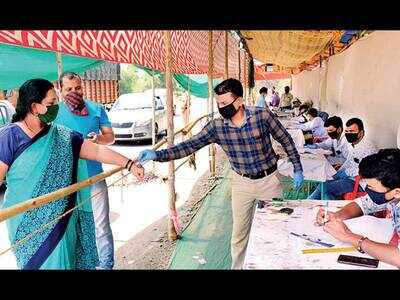
No corona safety gear for teachers on frontline
by Payal Gwalani and Raju ShindeTeachers’ associations say they even have to bring their own masks, sanitisers
Umesh Gaikar, a 29-yearold primary school teacher from Penn in Raigad district, was supposed to get married on Sunday. Instead, he spent a huge chunk of the day helping the police in collating data on people coming from Mumbai towards Raigad at Kharpada naka.
“My wedding ceremony can wait, but the national emergency that we are facing has to be dealt with on a priority basis. My duty as a citizen comes before my personal life,” Gaikar said.
He says that his family, his fiancée and her family agree with this decision.
Gaikar is among the primary school teachers from the state who have been roped in by various district authorities to manage the influx of migrant workers to villages across Maharashtra. While the teachers feel fortunate to serve the nation in any way they can, they are a little disappointed over the government not extending them benefits such as insurance cover and protective gear.
“The teachers are stationed at district borders where they are registering details of all the people entering a particular district. In the interiors, many of them are working at the panchayat offices, keeping records of villagers returning from bigger cities, some are even guarding the quarantine centres,” said Nitin Dahifale, secretary of Gyandeep Primary Teachers’ Association.
The president of the association, Vasudev Bade, said that even the senior citizens and physically-challenged teachers are helping out in the task. “Some have even cancelled their holidays to take part in this work. In fact, a couple of teachers in Sangli district passed away after coming in contact with some suspected Covid patients. The families of these teachers have now lost their only breadwinners,” he said.
The association says that like the police force in urban areas, the state government must extend an insurance cover to these frontline workers too. “The teachers are often working round the clock in shifts, coming in contact with hundreds of migrants every day. They are doing all this without any provisions from the state. Even the masks and the sanitisers they need are brought by them,” said Dahifale.
Bade said that the association has made a request to the state government to make appropriate provisions for the teachers who are also government employees, engaged in the state's work. “We also request the government to keep the dignity of our profession in mind while allocating duties. For example, some teachers were given duties outside the alcohol shops which would give out a wrong signal to the students in these vulnerable areas,” he said.
The association has also requested the government to provide concession from these duties to physically challenged, those above 55 years of age and teachers suffering from diseases such as diabetes that make them more vulnerable than others.